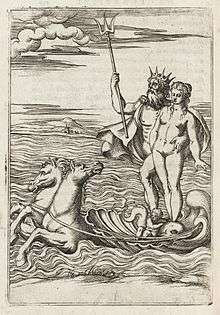Vincenzo Cartari

Vincenzo Cartari (c.1531–1569) was an Italian mythographer and diplomat of the Italian Renaissance.
According to Jean Seznec, Cartari was probably a protégé of the duke of Ferrara. He was born in Reggio nell’Emilia. In his work Imagini colla sposizione degli dei degli antichi ("Images depicting the gods of the ancients") of 1556, he identifies Lilio Gregorio Giraldi's De deis gentium varia et multiplex historia of 1548 as one of his sources. Despite the success of De deis, Cartari's work competed with it by going for a populist approach, with woodcuts of the ancient gods by Bolognino Zaltieri. Cartari focussed on the gods' iconography and explained their clothing, expressions, poses and attributes. Cartari's work was an influence on that of Gian Paolo Lomazzo. The antiquarian and philologist Lorenzo Pignoria added extra text and notes to the work in 1615 along with Seconda Parte delle Imagini de gli Dei Indiani, a second volume containing a short series of images of Mexican and Japanese deities. In his Teutschen Academie Joachim von Sandrart writes of his respect for Cartari's work, which Sandrart republished in translation in 1680 with new illustrations.
External ink
![]() Media related to Vincenzo Cartari at Wikimedia Commons
Media related to Vincenzo Cartari at Wikimedia Commons